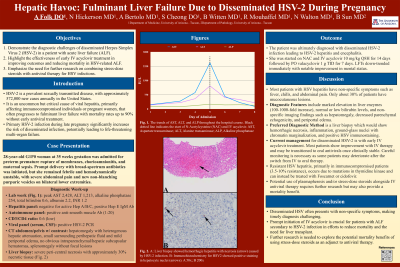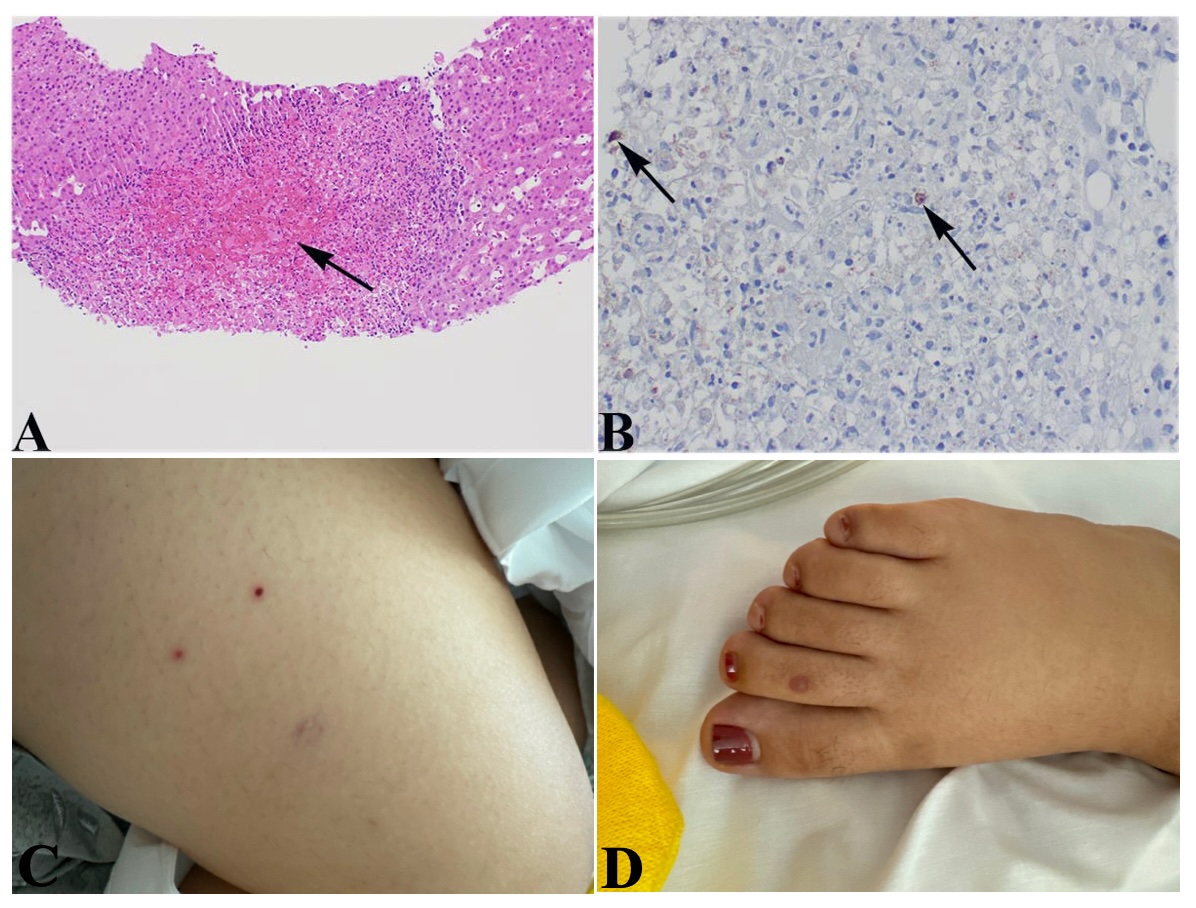Sunday Poster Session
Category: Liver
P1286 - Hepatic Havoc: Fulminant Liver Failure Due to Disseminated HSV-2 During Pregnancy
Sunday, October 27, 2024
3:30 PM - 7:00 PM ET
Location: Exhibit Hall E

Has Audio
.jpg)
Akira Folk, DO
University of Arizona College of Medicine
Tucson, AZ
Presenting Author(s)
Akira Folk, DO1, Natalie Hickerson, MD2, Samuel H. Cheong, DO2, Brandon Witten, MD1, Rama Mouhaffel, MD2, Aaron Bertolo, MD2, Nate Walton, MD2
1University of Arizona College of Medicine, Tucson, AZ; 2Banner - University of Arizona, Tucson, AZ
Introduction: Herpes simplex virus 2 (HSV-2) is a prevalent sexually transmitted disease with approximately 572,000 new cases annually in the United States. Although HSV-2 infection is common, disseminated HSV-2 is rare, typically occurring in immunocompromised individuals or pregnant women. Primary HSV-2 infection during late pregnancy increases the risk of disseminated infection, which can lead to life-threatening conditions such as fulminant liver failure. Untreated HSV hepatitis has a high mortality rate that can be reduced with early intravenous (IV) acyclovir therapy.
Case Description/Methods: This case study discusses a 28-year-old woman at 35 weeks gestation who developed acute liver failure, vesicular skin lesions, and altered mental status shortly after childbirth. She was diagnosed with disseminated HSV-2 infection leading to HSV hepatitis. Diagnosis was challenging due to recent negative HSV testing, vague symptoms, and unremarkable abdominal imaging. Initial examination and a fern test suggested intrauterine infection from preterm premature rupture of membranes, prompting a cesarean section. Despite prompt delivery and broad-spectrum antibiotics, the patient remained febrile and unstable, with escalating liver enzymes and severe abdominal pain. New vesicular lesions appeared on her lower extremities. Further investigation confirmed disseminated HSV-2 infection with fulminant liver failure, non-blanching purpuric vesicles, and encephalitis, supported by positive serum and cerebrospinal fluid HSV-2 polymerase chain reaction results. The patient's condition and liver enzyme levels significantly improved after starting IV acyclovir therapy. Histopathological confirmation of HSV hepatitis was obtained through liver biopsy (Figure 1).
Discussion: Patients with disseminated HSV often present with non-specific symptoms, making timely diagnosis challenging. While some may have mucocutaneous lesions aiding diagnosis, others may lack such evidence. Prompt initiation of IV acyclovir is crucial for HSV-positive patients presenting with acute liver failure to reduce mortality. Further research is needed to explore the potential benefits of combining stress-dose steroids with antiviral therapy.

Disclosures:
Akira Folk, DO1, Natalie Hickerson, MD2, Samuel H. Cheong, DO2, Brandon Witten, MD1, Rama Mouhaffel, MD2, Aaron Bertolo, MD2, Nate Walton, MD2. P1286 - Hepatic Havoc: Fulminant Liver Failure Due to Disseminated HSV-2 During Pregnancy, ACG 2024 Annual Scientific Meeting Abstracts. Philadelphia, PA: American College of Gastroenterology.
1University of Arizona College of Medicine, Tucson, AZ; 2Banner - University of Arizona, Tucson, AZ
Introduction: Herpes simplex virus 2 (HSV-2) is a prevalent sexually transmitted disease with approximately 572,000 new cases annually in the United States. Although HSV-2 infection is common, disseminated HSV-2 is rare, typically occurring in immunocompromised individuals or pregnant women. Primary HSV-2 infection during late pregnancy increases the risk of disseminated infection, which can lead to life-threatening conditions such as fulminant liver failure. Untreated HSV hepatitis has a high mortality rate that can be reduced with early intravenous (IV) acyclovir therapy.
Case Description/Methods: This case study discusses a 28-year-old woman at 35 weeks gestation who developed acute liver failure, vesicular skin lesions, and altered mental status shortly after childbirth. She was diagnosed with disseminated HSV-2 infection leading to HSV hepatitis. Diagnosis was challenging due to recent negative HSV testing, vague symptoms, and unremarkable abdominal imaging. Initial examination and a fern test suggested intrauterine infection from preterm premature rupture of membranes, prompting a cesarean section. Despite prompt delivery and broad-spectrum antibiotics, the patient remained febrile and unstable, with escalating liver enzymes and severe abdominal pain. New vesicular lesions appeared on her lower extremities. Further investigation confirmed disseminated HSV-2 infection with fulminant liver failure, non-blanching purpuric vesicles, and encephalitis, supported by positive serum and cerebrospinal fluid HSV-2 polymerase chain reaction results. The patient's condition and liver enzyme levels significantly improved after starting IV acyclovir therapy. Histopathological confirmation of HSV hepatitis was obtained through liver biopsy (Figure 1).
Discussion: Patients with disseminated HSV often present with non-specific symptoms, making timely diagnosis challenging. While some may have mucocutaneous lesions aiding diagnosis, others may lack such evidence. Prompt initiation of IV acyclovir is crucial for HSV-positive patients presenting with acute liver failure to reduce mortality. Further research is needed to explore the potential benefits of combining stress-dose steroids with antiviral therapy.

Figure: Figure 1. A: Live biopsy showed hemorrhagic hepatitis with necrosis (arrow) caused by HSV2 infection, 50x. B: Immunohistochemistry for HSV2 showed positive staining in hepatocyte nuclei (arrows), 200x. C-D: Vesicular lesions on the lower extremities
Disclosures:
Akira Folk indicated no relevant financial relationships.
Natalie Hickerson indicated no relevant financial relationships.
Samuel Cheong indicated no relevant financial relationships.
Brandon Witten indicated no relevant financial relationships.
Rama Mouhaffel indicated no relevant financial relationships.
Aaron Bertolo indicated no relevant financial relationships.
Nate Walton indicated no relevant financial relationships.
Akira Folk, DO1, Natalie Hickerson, MD2, Samuel H. Cheong, DO2, Brandon Witten, MD1, Rama Mouhaffel, MD2, Aaron Bertolo, MD2, Nate Walton, MD2. P1286 - Hepatic Havoc: Fulminant Liver Failure Due to Disseminated HSV-2 During Pregnancy, ACG 2024 Annual Scientific Meeting Abstracts. Philadelphia, PA: American College of Gastroenterology.
